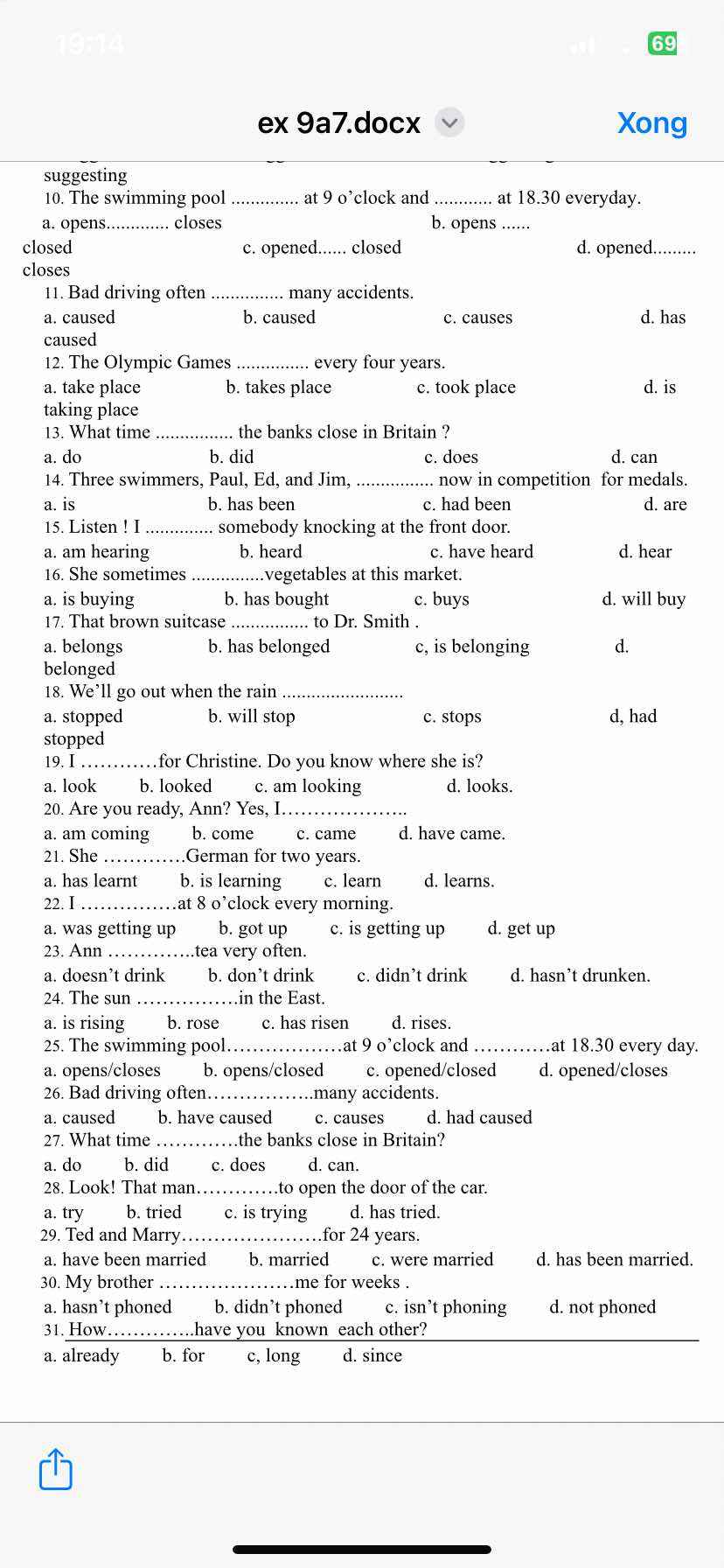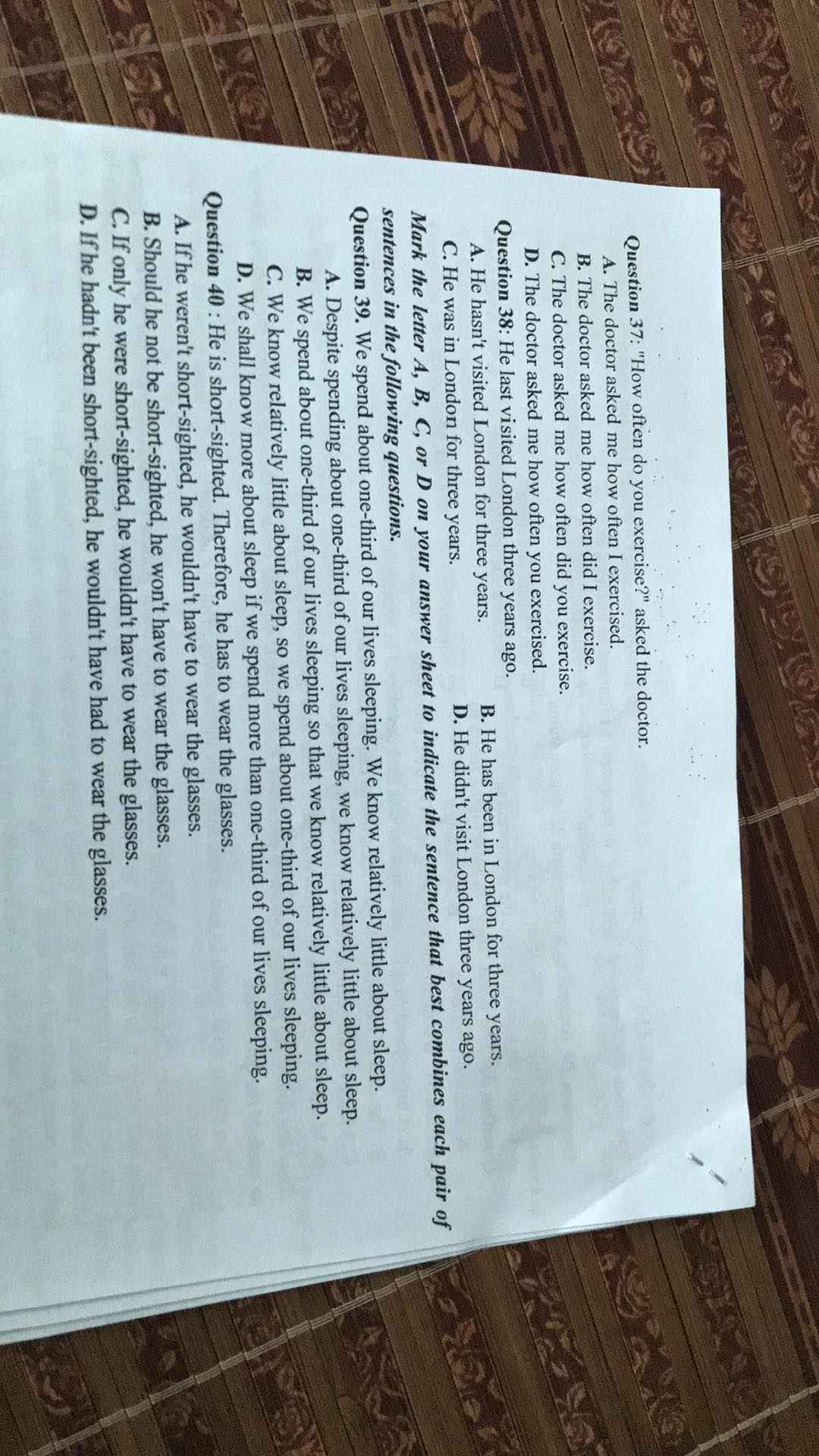Exercise 1: Choose the word whose underlined part pronounced differently from the others
1. A. get B. sometimes C. often D. study
2. A. always B. play C. face D. barbecue
3. A. judo B. rode C. some D. hope
4. A. school B. street C. square D. shopping
Exercise 2: Choose the word whose stress is different from the others.
1. A. student B. teacher C. armchair D. engineer
2. A. cupcake B. dessert C. color D. pizza
Exercise 3: Choose the...
Đọc tiếp
Exercise 1: Choose the word whose underlined part pronounced differently from the others
1. A. get B. sometimes C. often D. study
2. A. always B. play C. face D. barbecue
3. A. judo B. rode C. some D. hope
4. A. school B. street C. square D. shopping
Exercise 2: Choose the word whose stress is different from the others.
1. A. student B. teacher C. armchair D. engineer
2. A. cupcake B. dessert C. color D. pizza
Exercise 3: Choose the word CLOSEST in meaning to the underlined word.
1. If you have any questions, please raise your hand.
A. put down B. come out C. take off D. put up
2. Please find a quiet place to read so you can concentrate on the story.
A. focus B. understand C. move D. watch
Exercise 4: Choose the word OPPOSITE in meaning to the underlined word.
1. Beginning students know only a few English words. Advanced students know a lot.
A. Excellent B. Intelligent C. Basic D. Complex
2. I'm very happy for being accepted to work for charity this summer.
A. recognized B. received C. refused D. allowed
Exercise 5: Choose the correct answer.
1. Right now, they __________ a new song in the studio.
A. are recording B. record C. recorded D. records
2. My students _____________ hard – working.
A. isn’t B. aren’t C. do D. doesn’t
3. The trains are vey _________. It’s only 30 minutes to London from here.
A. fast B. slow C. enormous D. tiny
4. Linda: “What a beautiful dress you are wearing, Mary! - Mary: “__________”
A. Thanks. It’s nice of you to say so. B. Not at all.
C. I’m glad to say so. D. It’s not good.
5. She’s interested in ________ because she’s good with numbers.
A. PE B. music C. math D. history
8. I __________ my room at the moment.
A. am cleaning B. clean C. cleaned D. will clean
9. The kids __________ outside in the yard.
A. are playing B. play C. played D. will play
Exercise 6: Give the correct form of the verb.
1. Mai usually (wear) __________a school uniform, but today she (wear) ___________ a T-shirt and jeans
2. My parents (not work) ________________right now.
3. My brother (dance) _____________with his friends in front of the class now.
4. My sister often (do) _______________ her homework in the evening, but this evening she (watch)_______________ TV.
5. ________ you usually ______________ milk for breakfast? (drink)
Exercise 7: Complete the sentences with comparative form.
1. My bag is (nice) _______________ your bag.
2. DVD players are (cheap) ________________TVs.
3. Canada is (cold) __________________ Spain.
4. He’s (old) ______________me.
5. That city is (exciting) __________________ my town.
Exercise 8: Complete the text with superlative form.
New York is (1. famous) the most famous city in the USA. More than eight million people live there. Central Park is (2. beautiful) ________________ park in the city. There are a lot of trees and flowers. Broadway is (3. long) ________________street in the city. It’s 24 km long. The Subway is (4. fast) _______________way to travel. FAO Schwarz is (5. large) ___________________ toy store. Lots of people shop there.
Exercise 9: Choose the best answer.
Dear Phong,
How (1) _______you? (2) _______ you want to know about a typical day at my school? I (3) _____ to school with my brother, and my friend Sam. School starts at 8:45. (4) ______ the morning, we have five lessons. Then we have lunch. I (5) _____ have lunch at school, I go home. In the afternoon, there (6) __________ two lessons. My favorite subject is geography. After school we play football. What about you? Bye for now.
Linda.
1. A. do B. go C. are D. is
2. A. Do B. Does C. Are D. Did
3. A. walk B. walks C. walking D. walked
4. A. On B. In C. At D. About
5. A. don’t B. doesn’t C. not D. didn’t
6. A. have B. is C. are D. has
Exercise 10: Read the text and choose the best answer.
A Day at Summerhill
Summerhill is a boarding school in south-east England. It is a school with a difference because the teachers don’t make the rules - the students make them.
Breakfast is from 8.00 to 9.00 and the lessons start at 9.30. Susan is a student here - she likes lessons. She is studying a lot of subjects. Ivan is a student here too. He isn’t interested in lessons and he can play all day if he wants.
At 12.30 it is lunchtime, and the students and teachers eat together. There are three choices of meal: one with meat, a vegetarian option and a salad bar, too.
At 1.45 there is a meeting. The students and teachers talk about problems and they can change school rules in this meeting. Then there are free-time activities: orchestra practice, drama group or sport. Ivan goes shopping in town. Susan plays the violin with the orchestra.
At 5.30 it is dinner time. After dinner students chat and do homework. Younger children go to bed before 9.30, but older children can go to bed when they want.
So that is a day at Summerhill. Do you think school is better when the students make the rules?
1. Lessons at Summerhill start after _________.
A. breakfast B. lunch C. dinner
2. The lessons begin at ________.
A. 8.00 B. 9.00 C. 9.30
3. Ivan doesn’t like _______.
A. shopping B. doing lessons C. playing the violin
4. Susan is studying _________subjects.
A. a lot of B. one C. two or three
5. At lunchtime the students eat with __________.
A. the very young students







¯\_(ツ)_/¯